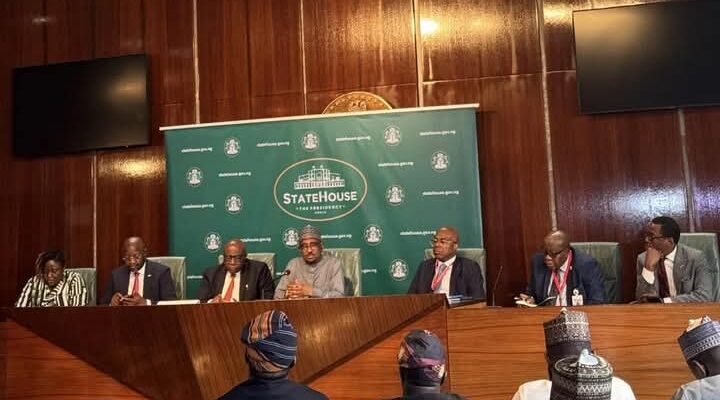Chief Executive Officer Nigerian Midstream and Downstream Petroleum Regulatory Authority (NMDPRA) Farouk Ahmed, Tuesday, said the agency issued 47 Licences to Establish (LTE) refineries in the country in the last one year.

He said the agency also issued 30 Licences to Construct (LTC) refineries within one year, marking a significant step toward enhancing Nigeria’s refining capacity.
The licenses, it said, covered a combined refining capacity of nearly three million barrels per day (bpd).
He also revealed that the importation of Premium Motor Spirit (PMS) dropped sharply by about 30 million litres per day in the last eight months.
Specifically, the agency said the imports dropped from 44.6 million litres in August 2024 to 14.7 million litres by middle of April 2025, representing a 67% decline.
The NMDPRA boss spoke at a media parley with State House correspondents at the Presidential Villa in Abuja.
…Licencing activities
He said the NMDPRA’s recent licensing activities also include approvals for modular refineries in Edo, Delta and Abia states, expected to add an additional 140,000 bpd upon completion.
Ahmed said: “We have issued 47 Licenses to Establish, covering 1.75 million bpd and 30 Licenses to Construct for 1.23 million bpd. Currently, only four plants hold Licenses to Operate with a steady output of 27,000 bpd.
“Among the LTC projects, five are at the commissioning or construction stage, including the much-anticipated Dangote Refinery with a capacity of 650,000 bpd. Smaller projects include AIPCC Energy’s 30,000 bpd plant and Waltersmith’s second train with a capacity of 5,000 bpd.
“Six licensed private refineries and four public ones are producing a total of 1.12 million bpd,” he said. Private facilities contribute 679,500 bpd, led by Dangote’s single-train complex refining 650,000 bpd. Other modular refineries include Aradel (11,000 bpd), OPAC (10,000 bpd), Waltersmith (5,000 bpd), Duport Midstream Limited (2,500 bpd), and Edo Refining and Petrochemicals Company Limited (1,000 bpd).
“Publicly owned facilities operated by the Nigerian National Petroleum Company Limited add another 445,000 bpd from refurbished plants in Port Harcourt (150,000 bpd), Warri (125,000 bpd), Kaduna (110,000 bpd), and the old Port Harcourt unit (60,000 bpd).
“These developments underline our commitment to reducing dependency on imported refined products.”
The NMDPRA helmsman further said that the ongoing licensing efforts would expand domestic refining capacity while supporting economic growth through job creation and energy security.
…On fuel importation
Speaking on the feat around reduced fuel imports, he said local refineries, which contributed almost nothing in August 2024, ramped up output to 26.2 million litres per day by early April 2025, up from 3.4 million litres in September 2024.
“After contributing virtually nothing in August, local refineries ramped up production to 26.2 million litres per day by early April. This marks a significant jump from just 3.4 million litres recorded in September – the first month with measurable output,” he said.
The agency also said Nigeria’s total daily PMS supply surpassed the government’s benchmark consumption target of 50 million litres only twice in the past eight months — 56 million litres in November 2024 and 52.3 million litres in February 2025.
“In March, supply slightly dipped below the target at 51.5 million litres per day, and in the first half of April, it further dropped to 40.9 million litres,” he said.
The NMDPRA boss also spoke on how President Donald Trump’s inconsistency was fuelling international trade and crude oil policies as and negatively impacting Nigeria’s 2025 budget.
“The inconsistencies in the U.S. administration’s trade and oil policies will inevitably affect Nigeria’s revenue generation and economic growth.
“On October 11th, a product price policy was introduced, which influenced the crude oil and petrol markets. These markets have been experiencing a downward trajectory due to inconsistencies and U.S. government policies. A key factor is the American President’s aspiration to reduce crude oil prices below $50 per barrel by encouraging domestic exploration. This has implications for local industries in terms of crude oil pricing, product pricing, demand, and supply.
“As mentioned earlier, crude oil and product pricing are on a downward trajectory. While lower prices benefit consumers, they negatively impact national revenue inflow. For instance, last Friday saw crude oil prices drop from $73-$74 per barrel to $60 in a single day, severely affecting revenue from production.
“Additionally, revenue inflow is compounded by challenges like vandalism, illegal bunkering, and reduced production levels. OPEC recently reported that Nigeria’s production has dropped to 1.4 million barrels per day. A $10 decrease in crude oil prices significantly impacts the economy, national reserves, and the strength of the naira. “Although lower product prices may seem favourable to consumers, this volatility poses broader economic challenges.
“This instability persists as recent tariff exemptions by President Trump, particularly for China in vehicular tariffs, caused the market to rise again. This highlights ongoing fluctuations in the global oil industry,” he said.
…Energy security
The NMDPRA boss also outlined significant strides achieved by the agency to bolster energy security, optimise natural gas utilisation and ensure sustainable development across the midstream and downstream petroleum sectors.
He said key achievements include the promotion of robust local refining of crude oil and increased natural gas processing capacity, which have significantly improved energy security.
Ahmed said the NMDPRA also enabled market development by ensuring efficient wholesale supply and transparent pricing of gas and petroleum products.
He said the NMDPRA has prioritised efficient transportation networks, improving the availability of primary energy fuels nationwide. He said the agency also ensured effective distribution and steady supply of gas and petroleum liquids across the country.
According to him, the NMDPRA is supporting strategic sectors by maximizing natural gas utilisation in line with Nigeria’s economic goals.
He expressed the agency’s commitment to “sustainable practices, focusing on health, safety, environment and compliance to drive the long-term growth of the midstream and downstream sectors.
He said “Nigeria’s refining operations are undergoing significant transformation, with multiple private and state-owned refineries advancing in construction, commissioning and production stages.”
…MAN on U.S. tariff
In a related development, the Manufacturers Association of Nigeria (MAN) warned that the tariff hike on Nigeria’s products by the United States could negatively impact the execution of the country’s 2025 budget; and threaten the potential benefits of the African Continental Free Trade Area (AfCFTA) agreement.
Director General MAN Segun Ajayi-Kadir said this in a statement, Tuesday, a copy of which was obtained by Blueprint.
“The imposition of a 14 percent tariff on Nigerian exports significantly undermines the competitiveness of locally manufactured goods in the U.S. market.
“MAN members who are exporters in agro-processing, chemicals and pharmaceuticals, basic metal, iron & steel, non-metallic mineral products and other light industrial manufacturing rely heavily on the U.S. for market access. With increased costs for American buyers due to the tariffs, demand for Nigerian products is expected to decline.
“For instance, processed agricultural goods such as cocoa derivatives, sesame seeds, and ginger, which have gained modest penetration in U.S. markets, are likely to witness a drop in export volume,: he said.
Citing data from the National Bureau of Statistics (NBS) which stated that agricultural exports accounted for over N4.42 trillion in 2024, with the U.S. being one of the top destinations, the MAN boss said: “The tariff could potentially wipe out N1 to N2 trillion of that figure annually.”
“Over the past decade, manufacturers have made concerted and strategic efforts to support the country’s transition from exporting raw commodities to semi-processed and finished goods.
“However, higher market-entry costs because of higher tariff on Nigerian products reduce the profitability of such investments, making it more attractive for firms to revert to exporting raw materials.
“This is counterproductive to Nigeria’s industrialisation agenda and compromises the long-term goal of achieving export diversification under platforms such as the African Continental Free Trade Agreement (AfCFTA).
“MAN is deeply concerned about both the substance and the implications of the new U.S. tariff policy. Our foremost concern lies in the asymmetry of the trade action which undermines the spirit of international cooperation and disregards the developmental needs of emerging economies,” the statement further added.

